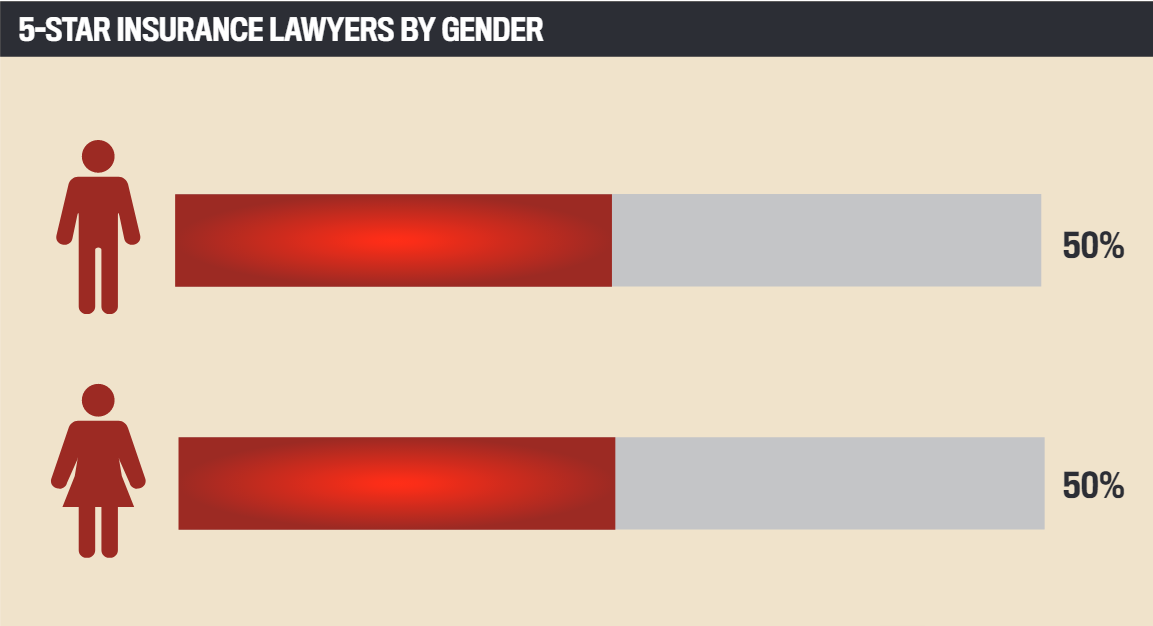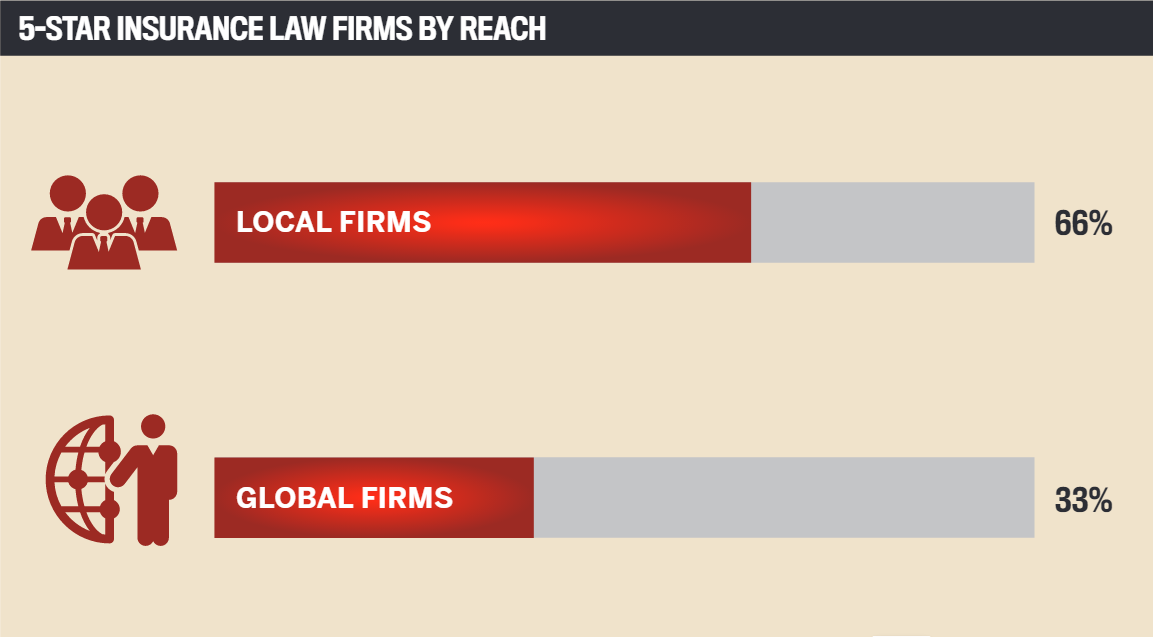
5-Star Insurance Law Firms and Lawyers 2021
Jump to winners | Jump to methodology | View PDF
New Zealand's Insurance Law Stars
Over the past year, the legal profession has been forced to change the way it operates and delivers services. COVID-19 lockdowns and travel restrictions meant a sudden transition to virtual court, and organisations grappled with the need to stay afloat in an environment where clients were difficult to access. The law firms that were able to strengthen their operations and thrive in this environment were generally those that were prepared to adapt quickly by using technology to take their interactions virtual.
In the insurance law realm, specialists were called upon to examine issues involving business interruption policies – something that has also been a major challenge in other jurisdictions like Australia and the UK. Although government support has helped prop up New Zealand businesses, there is some anticipation that problems will soon arise in this area. International pandemic-related restrictions have also generated concerns about supply chains and the movement of goods.
The business interruption conundrum
While other countries have been hit hard by COVID-19, New Zealand businesses were largely able to weather the storm thanks to measures implemented by the government.
“The success of public health measures taken to deal with COVID-19 – and the disruption caused by those same measures – means that COVID-19 has mostly come up in the context of business interruption policies in New Zealand,” say partner Simon Ladd and senior associate Sam Hiebendaal of 5-Star Insurance Law Firm Bell Gully.
COVID-19 concerns were handled differently on the whole, as the majority of business interruption policies in New Zealand do not cover communicable disease.
“Communicable disease cover was excluded from most business interruption policies and sub-limited in the handful of policies that did have an affirmative cover extension, so to date, COVID-19 has mostly been dealt with through the application of exclusion clauses,” say Ladd and Hiebendaal.
However, they noted that the rising trend of business interruption cases in Australia and the UK, where communicable disease cover is more widely provided, is expected to have “a flow-on effect on the development of insurance law” in New Zealand.
Ladd and Hiebendaal point to the result of FCA v Arch Insurance, a landmark UK Supreme Court business interruption case, which they say had “wider ramifications for the law on causation under all insurance policies. The decision overruled a controversial previous case which dealt with situations where there were multiple causes of the same loss, so has potentially increased insurers’ exposure in such cases.”
Communicable disease cover hasn’t been the sole sticking point for business interruption policies in the COVID-19 environment – insurance law specialists have also had to consider the pandemic’s effect in relation to other events.
For example, say Ladd and Hiebendaal, “in cases where a business has suffered loss due to an insured event – such as a fire or flood – how should the impact of COVID-19 on that business’s revenue be factored in when assessing the loss caused by the fire or flood, which is unrelated to the pandemic? This is an issue that we have already seen and which insurers will increasingly need to grapple with under the trends clauses in their policies.”

Disruptions to operations
While government support for local businesses in New Zealand softened the pandemic’s blow, that shield is not expected to hold for long, says Peter Hunt, a partner at 5-Star Insurance Law Firm McElroys.
“We expect more marginal and ‘zombie’ businesses to fail as this support comes to an end and global supply chain issues bite,” he says.
Hunt says McElroys’ marine insurance team has reported a rise in enquiries and instructions, due in large part to COVID- 19-related disruptions to supply chains and to the international movement of goods.
“We expect to see an increase in liability claims arising out of insolvency and business failures over the next 12 to 18 months,” he says. “It will be interesting to see if the industry comes up with an insurance package directly designed to deal with the risk of a pandemic. The COVID-19 experience has shown that there is clearly an insurable risk to look at covering.”
RiskNZ managing director David Turner notes that on the risk management front, the most common issues revolved around emergency planning, business continuity and organisational resilience.
“Many organisations thought they would be prepared in the event of a major disruption,” he says. “However, when reality hit, gaps started appearing, especially in the human areas of planning, as well as having the ability to sustain organisational resilience for a period of time – by that, I mean sharing the focus on not only sustaining the business during disruption, but to keep growing and moving forward.”
Law firms themselves also had to deal with disruptions to their operations.
“COVID-19 threw up numerous issues and created uncertainty – we had to adapt and to come up with new ways of doing things, both within the firm and externally,” Hunt says. “After some initial uncertainty about the impact of lockdown and border restrictions, we quickly returned to business as usual, just working in a different way.”
McElroys adapted seamlessly to remote work, given its existing technology and systems, but attending court was a challenge, and civil court was generally adjourned to later dates.
“We had more new instructions than we anticipated, which we put down to businesses and individuals evaluating their financial position during the lockdowns and making decisions to pursue insurance claims and litigation as a strategy to mitigate the potential financial impact of COVID-19,” Hunt says.
Meanwhile, Bell Gully participated in a landmark event – the first remote civil proceeding in New Zealand via videoconferencing. The hearing, at which the firm acted for a client on an urgent interim injunction, was held before the High Court.

The way forward
As COVID-19 support for businesses comes to an end, Ladd and Hiebendaal anticipate that the new challenges created by the pandemic will drive the evolution of insurance law.
“We expect that COVID-19 will continue to promote development in insurance law in 2021 as insureds seek to address cover in novel circumstances,” they say. “These cases may require the courts to re-examine and develop some of the fundamental principles of causation in insurance law, as the UK Supreme Court did in FCA v Arch.”
Turner believes the events of the past year have also improved the understanding and practice of risk management in all industries.
“There is always a ‘positive’ in a crisis, and the positive here is the newfound interest in adapting to uncertainty and us all improving our approach to risk management,” he says. “I have always been a firm believer that we need to make risk management an awareness and habit within our organisations – to make risk thinking something we do every day without even fully being aware that we are doing it – and I have seen this habit building during the past few months.”
Insurance law practices are expected to sustain a strong growth going forward. In this report, NZ Lawyer and Insurance Business NZ celebrate 12 firms and 12 lawyers whose incredible work in this space over the past year has set a high bar for the sector.
5-Star Excellence Awards
Insurance Law Firms
- Bell Gully
- DLA Piper
- Duncan Cotterill
- Fee Langstone
- Gilbert Walker
- Hesketh Henry
- McElroys
- MinterEllisonRuddWatts
- Robertsons
- Russell McVeagh
- Wotton + Kearney
- Wynn Williams
Insurance Lawyers
- Andrea Challis
McElroys - Caroline Laband
DLA Piper - Martin Smith
Gilbert Walker - Phillippa Fee
Fee Langstone - Cecily Brick
Fee Langstone - Matthew Harris
Gilbert Walker - Richard Hern
Wynn Williams - Andrew Horne
MinterEllisonRuddWatts - Craig Langstone
Fee Langstone - Michael Robertson
Robertsons - Helen Twomey
Robertsons - Emily Walton
Wynn Williams
Methodology
Over a 15-week period, NZ Lawyer and Insurance Business NZ worked together to glean feedback from general counsel, insurance industry professionals and lawyers to uncover the best of the best in the New Zealand insurance law field. The team gathered peer recommendations and spoke to insurance professionals and in-house counsel across the country to find out which law firms and insurance law specialists they held in high regard.
The professionals and firms they highlighted were ranked based on the quality of work, level of specialist expertise and service delivery to clients. The highest-ranking firms and lawyers were named 5-Star Award winners in the field of insurance law.

The past year has enabled a better understanding and approach to risk. This has come from the need for people to increasingly practise risk management in their respective fields, which has increased the desire and need to learn more about risk management.
In turn, this situation has positively impacted various industries, including our organisational insurance liabilities, legal and compliance factors. This is because when people start using risk more as a habit and not a separate and standalone function, then the interest and ability to identify risk and issues increases, thus making the actual risk landscape of an organisation more transparent and focused on value. When we focus on value, the attention from senior management teams and boards increases, and the overall threat of risk decreases.
We are finding that risk discussions at the senior levels are more active, the decisions have become more precise, and the understanding of what risk is and how to manage it is certainly now much more top of mind.
Keep up with the latest news and events
Join our mailing list, it’s free!


